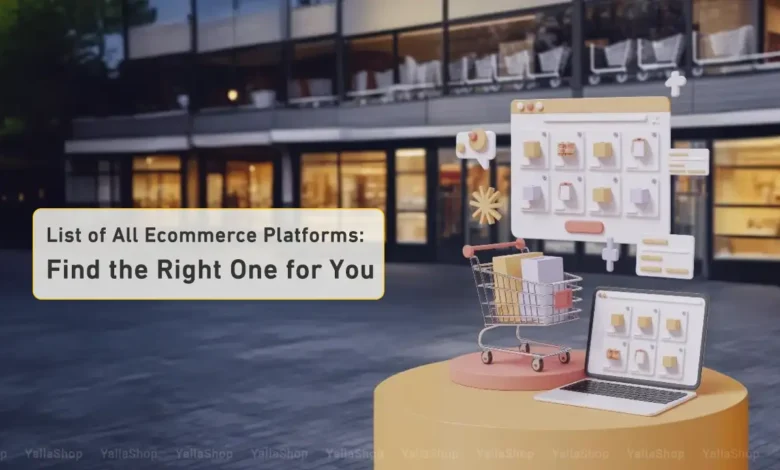list of all ecommerce platforms Find the Right One for You
what are the different ecommerce platforms

The list of all ecommerce platforms has transformed the way businesses operate, becoming a crucial component of modern commerce. With global retail ecommerce sales projected to surpass $6 billion in 2024 and $8 billion by 2025, this sector shows no signs of slowing down. Businesses must carefully select the right platform to meet customer demands, streamline operations, and remain competitive in this rapidly growing market. Choosing from the list of all ecommerce platforms is not just about features—it’s about finding the one that aligns with your goals.
Launch Your Online Store Today with YallaShop!
No coding. No hassle. Just powerful tools to grow your brand.
👉 Start for FREE and build your store in minutes!
What are the essential payment options in ecommerce platforms?
Offering diverse payment options is essential for ecommerce success. Below are the critical considerations when selecting from the list of all ecommerce platforms:
1-Customer Preferences
Consumers expect seamless checkout. Popular payment methods like credit cards, PayPal, and ApplePay must be supported to avoid abandoned carts.
2-Platform Compatibility
Not all platforms support the same payment gateways. Ensure the platform can integrate with your preferred systems to avoid checkout issues.
3-Building Trust
Secure, reliable payments enhance customer satisfaction and encourage repeat business.
Read About e commerce in egypt: Transforming How People Shop Today
What are the key shipping and fulfillment features in ecommerce platforms?
Efficient shipping and fulfillment are the backbone of ecommerce operations. When evaluating the list of all ecommerce platforms, consider these capabilities:
1-Carrier Integration
Platforms must support major carriers like UPS, FedEx, and DHL for reliable delivery.
2-Automation Tools
Tools like ShipStation automate shipping labels, tracking, and returns, improving efficiency.
3-Customer Expectations
Real-time tracking, multiple shipping options, and transparent delivery timelines are now expected by customers.
What advanced features do ecommerce platforms offer for complex needs?
Advanced capabilities help growing businesses handle diverse operations. The best platforms in the list of all ecommerce platforms offer features like:
1-Custom Pricing
Platforms like BigCommerce support wholesale pricing via customer groups and price lists.
2-Multi-Store Management
All-in-one solutions allow businesses to centralize inventory and manage branding across multiple stores.
3-Personalized Experiences
Segmented marketing based on customer behavior boosts retention and conversion.
How to plan your ecommerce platform budget?
Careful budgeting ensures your platform choice aligns with your business goals. Review all factors when comparing the list of all ecommerce platforms:
1-Subscription Costs
Platforms offer monthly or annual plans. Annual plans are often more cost-effective long-term.
2-Hidden Expenses
Account for premium themes, hosting, domains, and payment gateway fees.
3-Return on Investment (ROI)
Evaluate Total Cost of Ownership (TCO) and long-term ROI. BigCommerce users report breaking even in 8 months.
How long does it take to launch an ecommerce website?
Timeline depends on platform complexity and launch goals. From the list of all ecommerce platforms, some allow fast setup, while others require months of development.
1-Project Complexity
Prebuilt templates enable quick launches, while custom development takes months.
2-Seasonal Goals
Plan ahead for events like Black Friday to ensure readiness.
3-Testing and Optimization
Allocate time for performance testing and mobile optimization before launch.
What kind of support services do ecommerce platforms provide?
Support is essential for technical issues and scalability. Among the list of all ecommerce platforms, service levels vary widely:
1-Comprehensive Assistance
BigCommerce offers in-house experts to assist with setup and growth.
2-Platform Comparisons
Shopify’s reliance on AI bots may limit support quality compared to human assistance.
3-Seamless Operations
Best ecommerce platforms for beginners include dedicated support for smoother operations.
What are the types of ecommerce platforms?
Here’s a quick comparison of ecommerce platform types:
| Platform Type | Description |
|---|---|
| SaaS | Easy to use and maintain. Ideal for most businesses. |
| Composable Commerce | Highly customizable via integrations with best-in-class tools. |
| Open-Source | Maximum control and flexibility but requires development resources. |
What are the best ecommerce platforms?
Below is a list of the top ecommerce platforms and their key benefits. This table helps you compare and evaluate from the full list of all ecommerce platforms:
| Platform | Key Benefits |
|---|---|
| Shopify | User-friendly, scalable, extensive integrations. |
| YallaShop | Arabic-first interface, beginner-friendly, tailored for MENA market. |
| BigCommerce | SEO-friendly, scalable, supports multi-channel selling. |
| Wix eCommerce | Drag-and-drop builder, budget-friendly, great for beginners. |
| Squarespace | Beautiful templates, integrated marketing tools. |
| Magento | Powerful and customizable, ideal for large businesses. |
| Weebly | Affordable, simple, good for small-scale use. |
| Zyro | AI-powered tools, fast setup, low cost. |
| OpenCart | Open-source, highly customizable with extensions. |
| Ecwid | Easy integration with existing sites, multi-channel capabilities. |
| Shift4Shop | Feature-rich, no transaction fees, built-in marketing tools. |
| WooCommerce | Highly flexible, ideal for WordPress users. |
FAQs
How many e-commerce platforms are there?
There are hundreds of ecommerce platforms globally, including Shopify, WooCommerce, Magento, and BigCommerce. The complete list of all ecommerce platforms continues to grow.
How many types of e-commerce websites are there?
There are four main types: B2B, B2C, C2C, and C2B.
What are the different types of e-commerce platforms?
They fall into three categories: SaaS, Composable Commerce, and Open-Source. Each is represented within the list of all ecommerce platforms.
What are the 7 types of e-commerce with examples?
| Type | Example |
|---|---|
| B2B | Alibaba |
| B2C | Amazon |
| C2C | eBay |
| C2B | Fiverr |
| B2G | SAP |
| G2B | Government Portals |
| D2C | Warby Parker |
Is Shopee an e-commerce platform?
Yes, Shopee is a leading B2C and C2C ecommerce platform in Southeast Asia. It’s often included in the list of all ecommerce platforms.
Launch Your Online Store Today with YallaShop!
No coding. No hassle. Just powerful tools to grow your brand.
👉 Start for FREE and build your store in minutes!
Conclusion
The list of all ecommerce platforms is reshaping the retail landscape. By evaluating features like payment support, shipping, advanced capabilities, costs, and support, you can choose the platform that fits your goals. Whether you’re a startup or scaling enterprise, the right option from the list of all ecommerce platforms can fuel your success. With the right foundation, your ecommerce business can grow and thrive in a competitive digital environment.

